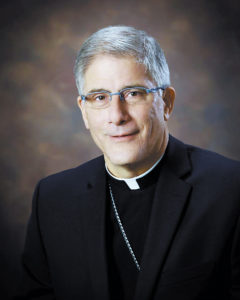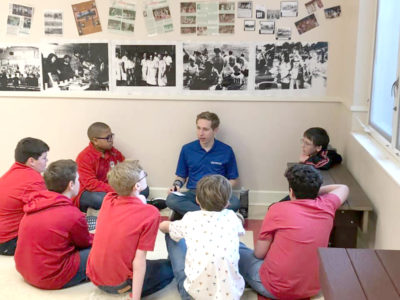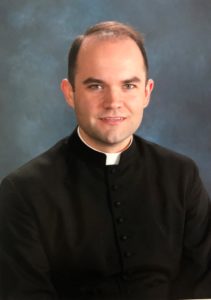
Obispo Joseph R. Kopacz
Por Obispo Joseph Kopacz
La demanda de conversión resuena en esta Cuaresma, por toda la Iglesia Católica, a medida que profundizamos aún más para desarraigar el mal del abuso sexual infantil y su demonio acompañante, el abuso de poder por parte de los líderes de la Iglesia. Aunque la conversión o metanoia pueden ser dolorosamente lentas, ya sea en la vida de un individuo o en una institución, la verdad y la demanda de justicia y misericordia nos obligan en este momento histórico a saber que nada es imposible para Dios (Lucas 1,37).
La Buena Nueva de Jesucristo no puede ser un faro de esperanza para el mundo a menos que la luz del Evangelio transforme a la Iglesia.
Durante esta Cuaresma, siempre doy gracias a todos los que tienen un profundo amor por la Iglesia, el Cuerpo de Cristo, y que quieren ver una temporada de refrigerio pero que entienden que, de acuerdo a las palabras de Dietrich Bonhoeffer, esto no es una cuestión de gracia barata. San Pedro en la proclamación del Kerygma en el primer Pentecostés señaló el camino para cada generación. “Por eso, vuélvanse ustedes a Dios y conviértanse, para que Él les borre sus pecados” (Hechos 3,19)).
Nunca nos cansemos de acompañar a quienes soportan la carga injusta de abuso sexual, que se experimentó especialmente en comunidades de nuestra Iglesia, sino también en fomentar la esperanza y la sanación de quienes padecen este flagelo donde quiera que se origine.
El Miércoles de Ceniza fuimos marcados con las cenizas del arrepentimient para el camino de la oración, el ayuno y la limosna. Estos tres pilares de la Palabra de Dios y la Eucaristía, cuerpo y sangre del Señor derramada por nosotros, son las lámparas para guiar nuestros pies durante la temporada sagrada de Cuaresma, pero verdaderamente, para cada estación, de cada año, como forma de vida.
Es fácil compartimentar estos fundamentos de nuestra fe, con una comida ligera el viernes, una oración rápida por la mañana o un cheque indoloro en domingo. Agradezcamos a Dios por esos momentos de gran avance en nuestras vidas, que nos ponen de rodillas, que crean hambre profunda y nos obligan a confiar en la generosidad de los demás.
Cuando viajé recientemente a la India durante dos semanas, había signos evidentes de pobreza y desesperación, como pueden imaginar, así como de la dedicación evangélica desinteresada de los discípulos ordenados, religiosos profesos y laicos.
En el sur de la India, uno de los sacerdotes todavía recordaba las consecuencias inmediatas de las graves inundaciones del año pasado. Ricos y pobres fueron expulsados de sus hogares y obligados a encontrar todos juntos una vivienda temporal. Algunos de los ricos se avergonzaron de esta repentina privación y se escondían detrás de las pantallas para la distribución diaria del pan con la esperanza de pasar desapercibidos. Gradualmente, salieron del aislamiento y hoy son algunos de los benefactores más grandes en el ministerio de servir a los abandonados. A menudo, se necesita una crisis para desencadenar una experiencia más profunda que la de nuestra humanidad común, fácilmente oculta bajo una apariencia en los estratos sociales.
Cada uno de nosotros tiene pasajes favoritos de las escrituras que nos pueden mantener en el camino durante el maratón espiritual que tenemos por delante. Dos versículos en particular hablan tanto de mi corazón como del corazón de la Iglesia en nuestros días. San Pablo nos alienta en nuestra disciplina de Cuaresma como él alentó a Timoteo. “Porque Dios no nos dio un espíritu de cobardía, sino de poder, amor y autocontrol. Así que no te avergüences de tu testimonio ante nuestro Señor”. (2 Timoteo 1,7-8)
Cada uno de nosotros, como individuos y familias, podemos aplicar los tres pilares: la oración, el ayuno y la limosna y poner en práctica las palabras de San Pablo. Además, como Iglesia, con San Pablo, sabemos que estamos al servicio del Reino de Dios en este mundo. “No den, pues, lugar a que se hable mal de ese bien que ustedes tienen. Porque el Reino de Dios no es una cuestión de comer o beber determinadas cosas, sino de vivir en justicia, paz y alegría por medio del Espíritu Santo. El que de esta manera sirve a Cristo, agrada a Dios y es aprobado por los hombres. Entonces, busquemos lo que nos lleva a la paz y a edificarnos unos a otros” (Romanos 14, 16-19). Con este espíritu podemos reconstruir la casa de Dios, la Iglesia, en medio de la crisis, y por todas las razones piadosas para eliminar la ceguera del pecado. Termino con las palabras del Papa Francisco de su mensaje de Cuaresma en 2017.
“Queridos amigos, la Cuaresma es el momento propicio para renovar nuestro encuentro con Cristo, vivir en su palabra, en los sacramentos y en nuestro prójimo. El Señor, que superó los engaños del tentador durante los cuarenta días en el desierto, nos muestra el camino que debemos tomar. Que el Espíritu Santo nos guíe en un verdadero viaje de conversión, para que podamos redescubrir el don de la palabra de Dios, purificarnos del pecado que nos ciega y servir a Cristo presente en nuestros hermanos y hermanas necesitados. Aliento a todos los fieles a expresar esta renovación espiritual también compartiendo las Campañas de Cuaresma promovidas por muchas organizaciones de la Iglesia en diferentes partes del mundo, y así favorecer la cultura de encuentro en nuestra única familia humana. Oremos los unos por los otros para que, al compartir la victoria de Cristo, podamos abrir nuestras puertas a los débiles y pobres. Entonces podremos experimentar y compartir al máximo la alegría de la Pascua”






